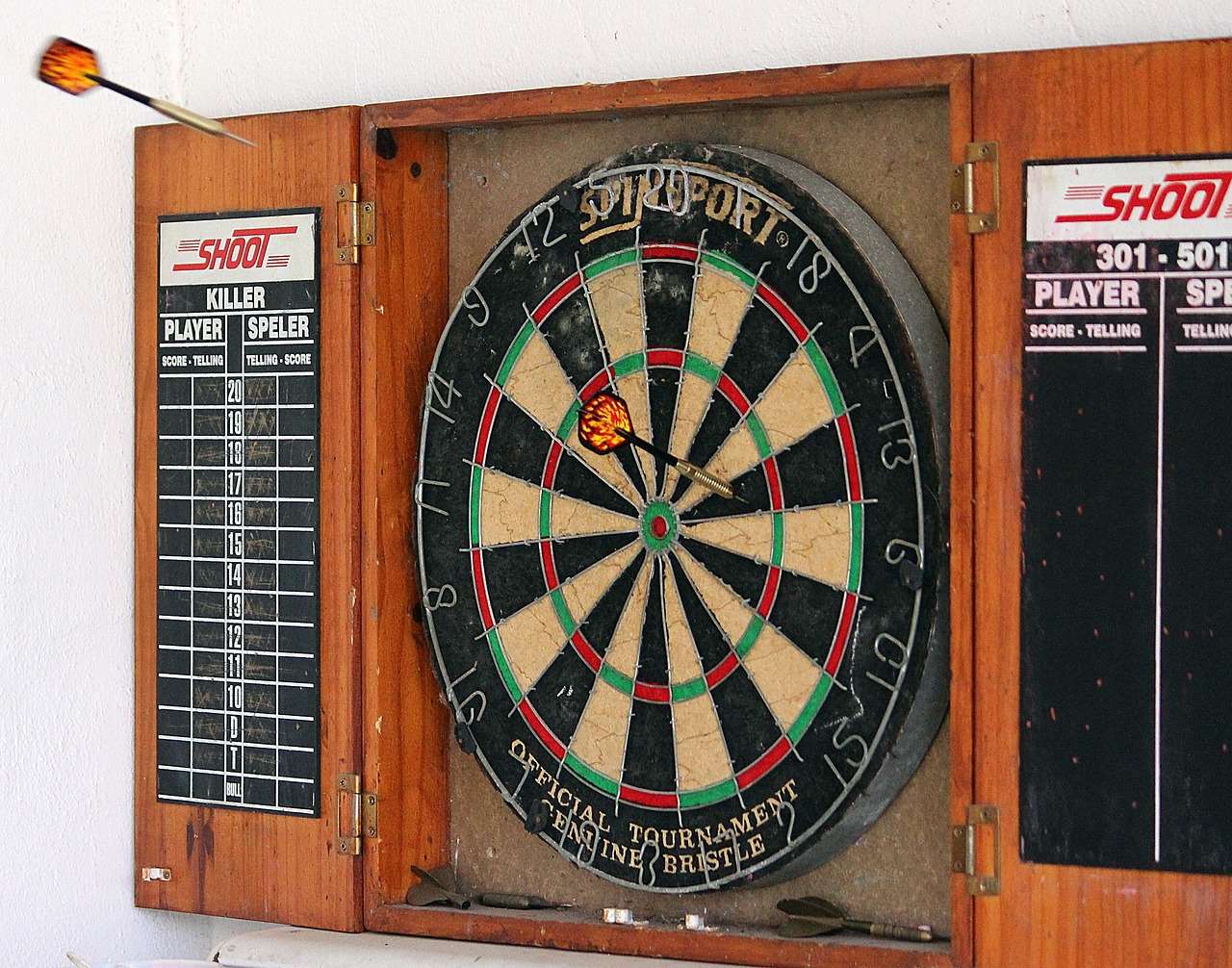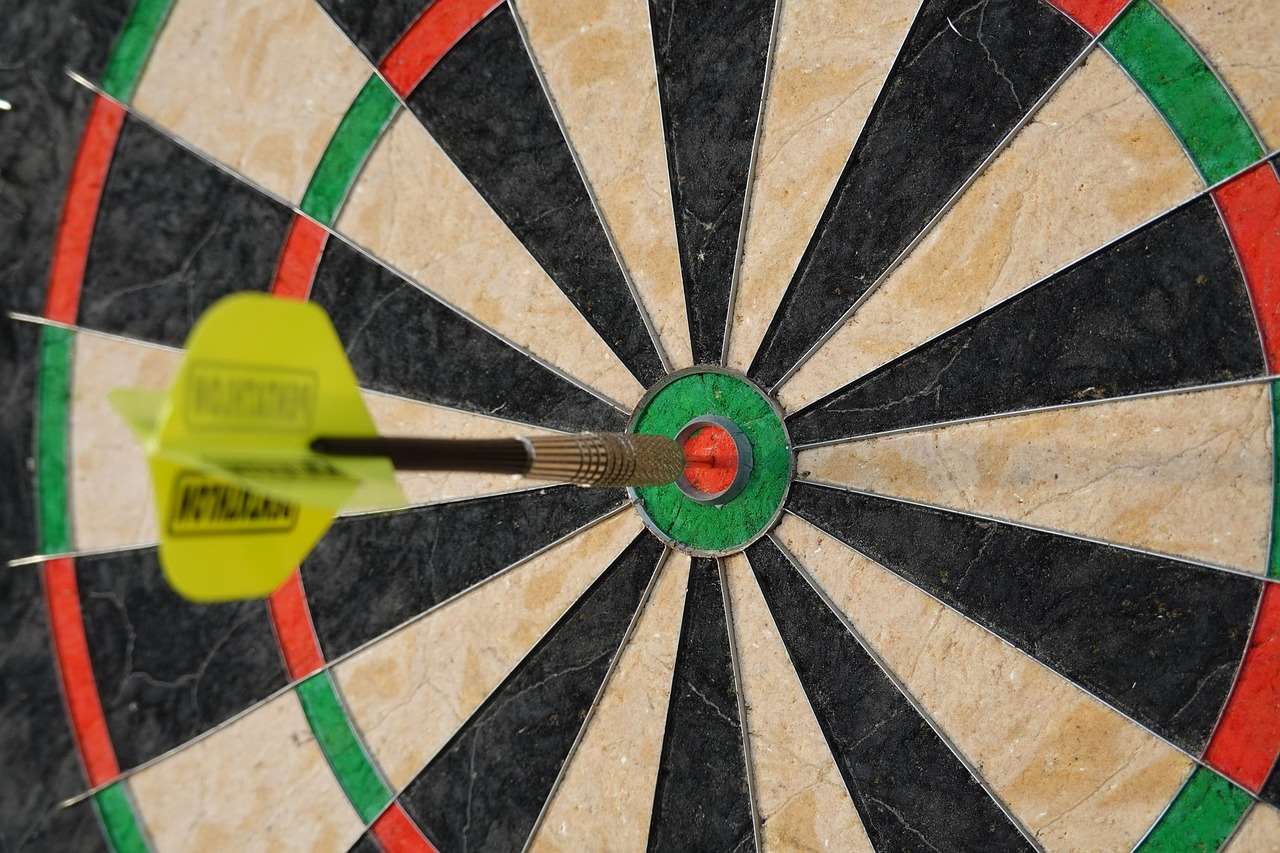Ensuring a positive and respectful atmosphere for everyone is key, making **Darts Etiquette For Pub Owners** crucial for fostering a thriving darts scene. This guide provides pub owners with the knowledge to create a welcoming and enjoyable darts environment, covering everything from board setup and maintenance to managing players and resolving conflicts.
 Still Using Pen & Paper (or a Chalkboard)?!
Still Using Pen & Paper (or a Chalkboard)?! 
Step into the future! The Dart Counter App handles all the scoring, suggests checkouts, and tracks your stats automatically. It's easier than you think!
Try the Smart Dart Counter App FREE!Ready for an upgrade? Click above!
Creating the Ideal Darts Environment: A Guide to Darts Etiquette For Pub Owners
As a pub owner, you play a significant role in shaping the darts experience for your patrons. By understanding and promoting good **darts etiquette**, you can create a more enjoyable and welcoming atmosphere, encouraging repeat customers and fostering a strong darts culture within your establishment. This involves not only providing the right equipment but also setting the right tone and addressing potential issues promptly. Understanding and enforcing a simple guide to **darts etiquette** is a crucial step in the success of your pub.

Essential Equipment and Setup: The Foundation of Fair Play
The quality of your darts equipment directly impacts the players’ experience. Here’s what you need to consider:
- Dartboard Placement: Ensure the dartboard is hung correctly. The center of the bullseye should be 5 feet 8 inches (1.73 meters) from the floor. The throwing line (oche) should be 7 feet 9 1/4 inches (2.37 meters) from the face of the dartboard. Incorrect measurements can lead to frustration and arguments.
- Adequate Lighting: Proper lighting is essential. The board needs to be brightly and evenly lit to minimize shadows and allow players to see clearly. Consider investing in a dedicated dartboard lighting system.
- Dartboard Maintenance: Rotate your dartboard regularly to distribute wear and tear evenly. This extends the life of the board and keeps the playing surface consistent. Replace worn-out boards promptly.
- Oche (Throwing Line): A clearly marked and stable oche is crucial. A raised oche is preferable as it prevents players from inadvertently stepping over the line.
- Sufficient Space: Ensure there’s enough space behind the throwing line for players to take their stance and throw comfortably.
Promoting Fair Play and Respectful Conduct
Beyond the physical setup, **promoting good sportsmanship** is vital. This involves setting clear expectations for player behavior and addressing any violations promptly and fairly. Consider posting a simple set of **darts etiquette** rules near the dartboard.
Key Etiquette Rules to Implement
- No Distractions During Throws: Players should refrain from talking, moving, or otherwise distracting the thrower while they are taking their turn. This is a cornerstone of good **darts etiquette**.
- Respect Your Opponent: Avoid gloating after a good throw or belittling an opponent after a bad one. A respectful attitude fosters a positive and enjoyable atmosphere for everyone.
- Retrieve Your Own Darts: Unless otherwise agreed upon, players should retrieve their own darts from the board.
- Wait Your Turn: Allow players to finish their throws before approaching the board.
- Avoid Excessive Noise: Keep noise levels to a minimum, especially during matches. While a lively atmosphere is welcome, overly loud conversations or music can be distracting.
Fostering a positive atmosphere ties directly into Darts Culture And Community Guide.
Dealing with Disputes and Conflicts
Disputes are inevitable, but how you handle them can significantly impact the overall atmosphere of your pub. Here’s how to manage conflicts effectively:
- Designate a Referee (If Necessary): For league matches or tournaments, appoint a neutral referee to oversee the games and resolve any disputes.
- Listen to Both Sides: Before making a ruling, listen carefully to both sides of the argument.
- Be Fair and Impartial: Apply the rules consistently and fairly to all players.
- Remain Calm and Professional: Even in heated situations, remain calm and professional. Avoid raising your voice or becoming argumentative.
- Enforce the Rules: Be prepared to enforce the rules, even if it means penalizing players. This demonstrates that you take **darts etiquette** seriously.

Encouraging a Welcoming and Inclusive Environment
A welcoming darts environment attracts a wider range of players and helps to build a loyal customer base. Consider these tips for promoting inclusivity:
Catering to Different Skill Levels
- Offer Beginner-Friendly Options: Consider offering beginner-friendly darts nights or coaching sessions to help new players learn the game. This helps attract more people and expand your community.
- Organize Different Levels of Competition: Offer different leagues or tournaments to cater to different skill levels. This ensures that everyone has a chance to compete and enjoy the game.
- Provide Advice and Guidance: Be available to offer advice and guidance to new players. A little encouragement can go a long way in helping them improve their game.
Promoting Respect and Inclusivity
- Establish a Zero-Tolerance Policy for Discrimination: Make it clear that discrimination of any kind will not be tolerated.
- Encourage Positive Interactions: Foster a culture of respect and support among players.
- Be Mindful of Language: Encourage players to use respectful language and avoid making offensive jokes or comments.

Maintaining Your Darts Equipment
Regular maintenance is essential for keeping your darts equipment in good condition and ensuring a fair and enjoyable playing experience. Remember, a well-maintained dartboard is key to maintaining proper **darts etiquette**.
Dartboard Care
- Rotate Regularly: As mentioned earlier, rotate your dartboard regularly to distribute wear and tear evenly.
- Clean the Board: Periodically clean the board with a soft brush to remove dust and debris.
- Replace Worn-Out Segments: Replace individual segments that are heavily worn or damaged.
Dart Maintenance
- Sharpen Dart Points: Sharpen dart points regularly to ensure they stick properly in the board. A dull point will cause darts to bounce out more frequently, which can lead to frustration.
- Check Dart Flights: Inspect dart flights for tears or damage and replace them as needed. Damaged flights can affect the dart’s trajectory.
- Tighten Dart Shafts: Regularly tighten dart shafts to prevent them from coming loose during play.

Leveraging Darts to Enhance Your Pub’s Appeal
Darts can be a valuable asset for attracting customers and boosting your pub’s revenue. Consider these strategies for leveraging darts to your advantage:
Organizing Darts Events and Tournaments
- Regular Darts Nights: Host regular darts nights to attract both casual players and more serious competitors.
- Themed Darts Events: Organize themed darts events, such as a “blind draw” tournament or a “killer” competition.
- Partner with Local Darts Leagues: Partner with local darts leagues to host their matches at your pub. This can bring in a steady stream of customers. You can learn more about this via Building Local Darts League Club Guide.
Promoting Your Darts Activities
- Advertise Your Events: Advertise your darts events on social media, in local newspapers, and on posters in your pub. Spread the word about your adherence to **darts etiquette** to attract serious players.
- Offer Special Deals: Offer special deals on drinks and food during darts events.
- Create a Darts-Friendly Atmosphere: Make your pub a welcoming and enjoyable place for darts players.
Addressing Common Darts Etiquette Violations
Even with clear rules in place, violations of **darts etiquette** can still occur. Here’s how to address some common issues:
Dealing with Line Stepping
If a player consistently steps over the oche, politely remind them of the rule. If the behavior continues, consider issuing a warning. In extreme cases, you may need to disqualify the player.
Managing Distractions
If a player is distracting others during their throws, ask them to stop. If they refuse, consider asking them to leave the area.
Resolving Score Discrepancies
If there is a discrepancy in the score, review the score sheet and consult with the players involved. If necessary, appoint a neutral party to make a final decision. Maintaining fair play and appropriate **darts etiquette** is a must for the sport.
Handling Disputes over Darts
If there is a dispute over whose darts are closest to the bullseye, use a measuring tool to determine the winner. A clear protocol ensures proper **darts etiquette**.

Conclusion: Fostering a Thriving Darts Community
By implementing these guidelines for **Darts Etiquette For Pub Owners**, you can create a welcoming, enjoyable, and respectful environment for all darts players. This will not only attract more customers but also foster a strong darts community within your establishment. Remember that consistent enforcement of these principles, along with clear communication, is essential for success. A well-managed darts area contributes positively to your pub’s atmosphere and overall business. Take the time to implement these practices, and you’ll see the benefits in increased customer loyalty and a thriving darts scene. Consider also looking into Promoting Local Darts to drive more traffic to your pub. Now is the perfect time to take action and elevate your darts offerings to attract new patrons and solidify your position as a premier darts destination.